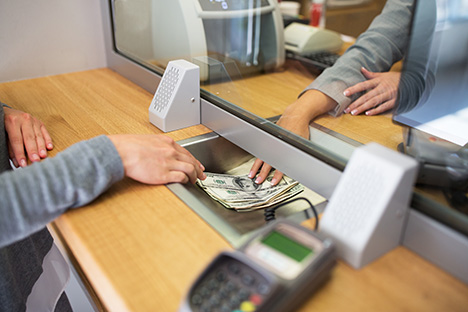My highest-conviction investment idea during the COVID-19 crash was the American banking sector, specifically the SPDR S&P Bank ETF (NYSE: KBE).
American banks went into the pandemic with historically strong balance sheets.
They were at no risk of failure.
On top of that, the rock-bottom valuations that were available as the market panicked made this exchange-traded fund an extraordinary opportunity.
This bank trade worked out great. The banking sector doubled within a year, far outpacing the S&P 500.

Now here we are in the midst of another market panic in the financial sector. And I believe opportunity is knocking again.
To me, Bank of America (NYSE: BAC) stands out as a wonderful investment opportunity.
Since early February of last year, Bank of America’s stock price has dropped from just under $50 to $28.
That is a steep decline of 42%. These shares need to almost double just to get back to where they were early last year.

But I think Bank of America actually stands to benefit from the current crisis.
As concern over the safety of regional banks has risen, customers have actually been seeking refuge in the perceived safety of the largest banks, like Bank of America.
In the days after the collapse of Silicon Valley Bank, more than $15 billion in new deposits flowed into Bank of America.
Instead of a “run on” the bank – which spelled the end for Silicon Valley Bank – Bank of America is experiencing a “run to” the bank.
If this banking crisis worsens, I expect more cash to flow from smaller regional banks and into the handful of “too big to fail” banks, like Bank of America.
As an investor, I love that Bank of America has an incredibly diversified deposit base.
I suspect this is the key reason Warren Buffett owns a whopping $33 billion worth of Bank of America stock, representing 13% of the company.
As of December 31, 2022, Bank of America had more than $1.9 trillion in customer deposits. Almost 113 million of them had balances of less than $250,000 and are eligible for Federal Deposit Insurance Corporation (FDIC) insurance.
This is exactly the opposite of Silicon Valley Bank, which had one of the most concentrated deposit bases in the industry – a huge percentage of which were not FDIC insurable.
This is what made Silicon Valley Bank vulnerable to a mass exodus of customer cash.
This year, the consensus analyst estimate is for Bank of America to earn $3.41 per share. For next year, those expectations rise to $3.64 per share.
That means this big bank is currently trading at 8.2 times this year’s earnings and just 7.6 times 2024 earnings.
That is very cheap for one of the most important banks in the world.
Also attractive is Bank of America’s dividend, which is currently set at $0.22 per quarter. That’s a yield of 3.14%.
The current banking crisis has set us up with a very attractive entry price for Bank of America.
The Value Meter rates Bank of America shares as “Slightly Undervalued.”

